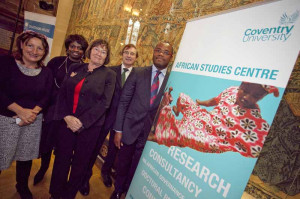In November 2011, the African Studies Centre at Coventry University joined with the Africa Programme at Chatham House; the independent policy institute on international affairs, to host an international conference on oil politics and sub-Saharan Africa.

back L-R): Jerome Okolo, Prof Bruce Baker; (front L-R): Rosalind Kainyah, Rt Hon Clare Short, Christina Katsouris, Hon Eng Irene Muloni
This policy orientated conference looked at current government, NGO and academic thinking on oil and gas, and how oil companies, governments and NGOs could use Africa’s oil riches to enhance development and reduce poverty.
The conference attracted keynote speakers including the Hon Eng Irene Muloni, Ugandan Minister for Energy and Mineral Development, and former UK Cabinet Minister the Rt Hon Clare Short, Chair of the Board for Extractive Industries Transparency Initiative (EITI).
Professor Bruce Baker is the Director of the African Studies Centre at Coventry University. He said: “The oil industry in Africa is rarely out of the news, with stories of environmental destruction by spillages; armed militants attacking oil installations; oil pipelines being broken and exploding causing deaths; bribery of officials to gain access to mining rights; oil exploration in ecologically sensitive regions; and the health hazard of gas flaring all hitting the headlines.
“However, there are positive aspects to this industry, as oil and gas may well hold the key to economic development for impoverished countries in Africa. The challenge is therefore to maximise the potential whilst minimising the risks, to ensure the politics of Africa promotes good governance. This conference aimed to bring together key stakeholders to look at some of these pressing issues and discuss a way forward.”
The conference centred on a number of key themes, with different sessions hosted by a variety of panels taken from participating stakeholders. The opening session looked at the positive impacts and opportunities that oil and gas production presents to African states that can effectively manage their resources. This was followed by an industry perspective from Tullow Oil, describing the growing importance for responsible multinationals to have a broader, longer term view of how their investments fit into national developmental goals.
The morning continued with a look at lessons learnt by Shell, following spillages; oil politics in Chad; and Oxfam’s representative emphasising the importance of progressive legal frameworks for new producers. The afternoon began by dealing with the issue of the resource curse; then moved to resolving governance challenges, with the internet being cited as a way to enable greater transparency in legislation, and new technology such as oil finger printing instrumental in tackling theft and corruption.
The Rt Hon Clare Short closed the conference by reminding the audience that the challenges outlined do not just impact on Africa, and that global solutions are needed to what is a global problem.
The conference was supported by Coventry University African Studies Centre, the African Programme at Chatham House, Shell and Tullow Oil plc. To learn more about the conference and see extracts on video follow this link.



